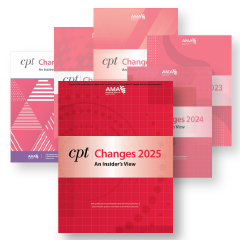by Aimee L. Wilcox, CPMA, CCS-P, CST, MA, MT
Sep 5th, 2023
ICD-10-CM annual updates were announced on June 16, 2023 by CMS and include 395 new codes, 25 deleted codes, and 13 revised codes. Shortly thereafter, CMS also updated the 2024 addendum, tabular list, index, code tables, and the code descriptions.
As often occurs in these updates, the code deletions occur because the code description no longer accurately reflects the changes and needs to be expanded. For example, the current ICD-10-CM code set only has a single code (G20) for reporting Parkinson’s disease; however, with the updates this year, code G20 has been deleted and replaced with the following:
DELETED
G20 Parkinson’s disease
NEW
G20.A1 Parkinson’s disease without dyskinesia, without mention of fluctuations
G20.A2 Parkinson’s disease without dyskinesia, with fluctuations
G20.B1 Parkinson’s disease with dyskinesia, without mention of fluctuations
G20.B2 Parkinson’s disease with dyskinesia, with fluctuations
As additional medical research and testing occur, the medical community identifies and further categorizes diseases to facilitate proper diagnosis and treatment. In the case of Parkinson’s disease, additional information has been reported to show that Parkinson’s can include dyskinesia, which describes involuntary and erratic movements of the face, arms, legs, and trunk. These codes describe the Parkinson’s patient who either does or does not have dyskinesia and whether or not the documentation mentions the patient reporting fluctuations.
According to the The Journal of Neuropsychiatry and Clinical Neurosciences, it is common for Parkinson’s patients to experience both mood and motor fluctuations. These fluctuations correlate with the dosing frequency and duration of Levodopa. Parkinson’s patients are known to suffer from a lack of dopamine, which is a type of neurotransmitter and hormone that is essential to many bodily functions, including movement, memory, and mood. Lack of dopamine is associated with Parkinson’s and other mental health and neurological diseases.
Levodopa is commonly prescribed for Parkinson’s patients, as it is a known precursor for dopamine. When the levels of Levodopa are high the patient often feels good, and when the levels begin to lower, prior to the next dose, the patient may experience motor fluctuations such as stiff physical movements caused by stiffened muscles. These highs and lows are often referred to as the “on” and “off” of long-term Levodopa use.
When assigning the new codes, look for documentation that supports Parkinson's, the presence of dyskinesia, and any mention of motor fluctuations, not to be mistaken for mood fluctuations. If the documentation fails to include language evidence for dyskinesia and for motor fluctuations, assign G20.A1, Parkinson’s disease without dyskinesia and without mention of fluctuations.
Acute appendicitis, another common diagnosis that many coders have memorized, also underwent significant and noteworthy changes for the 2023-2024 year. Prior to these updates, acute appendicitis was reported with a code from one of the following three categories:
- K35.2- Acute appendicitis with generalized peritonitis
- K35.3- Acute appendicitis with localized peritonitis
- K35.8- Other and unspecified acute appendicitis
Current code descriptions are expanded for acute appendicitis with localized peritonitis but not generalized peritonitis. It is not uncommon for cases with generalized peritonitis to include the presence of an abscess or even for the appendix to perforate (burst), resulting in spillage from the intestines entering the abdominal cavity, causing additional complications. The current ICD-10-CM codes simply do not provide code descriptions to report these factors at a high specificity level; therefore CMS has approved the addition and expansion of these codes. Please note the additional descriptions associated with each code (listed beneath the initial code description) as follows:
2023-2024
K35.20- Acute appendicitis with generalized peritonitis, without abscess
K35.200 Acute appendicitis with generalized peritonitis, without perforation or abscess
Acute appendicitis with generalized peritonitis, without rupture or perforation of appendix, NOS
K35.201 Acute appendicitis with generalized peritonitis, with perforation, without abscess
Acute appendicitis with generalized (diffuse) peritonitis, following rupture or perforation of appendix, NOS
K35.209 Acute appendicitis with generalized peritonitis, without abscess, unspecified as to perforation
Acute appendicitis with generalized peritonitis, NOS
K35.21- Acute appendicitis with generalized peritonitis, with abscess
K35.210 Acute appendicitis with generalized peritonitis, without perforation, with abscess
Acute appendicitis with generalized peritonitis, without rupture or perforation of appendix, with abscess
K35.211 Acute appendicitis with generalized peritonitis, with perforation and abscess
Acute appendicitis with generalized (diffuse) peritonitis, following rupture or perforation of appendix, with abscess
K35.219 Acute appendicitis with generalized peritonitis, with abscess, unspecified as to perforation
Acute appendicitis with generalized peritonitis and abscess
Whenever new codes are added to the ICD-10-CM code set, it is helpful to take a look at the data file published by the Centers for Disease Control and Prevention (CDC) for ICD-10 Coordination and Maintenance Committee Meeting Diagnosis Agenda. This is a great reference tool that allows you to see the reason certain codes were submitted for consideration. For example, the CDC PDF provides the following explanation of the proposal submission, as follows:
| “Appendicitis with Generalized Peritonitis with or without Perforation When appendicitis leads to a frank perforation or rupture, that will usually cause severe peritonitis, which is commonly generalized peritonitis, although it can sometimes become walled off and localized. However, there can also be appendicitis with microperforations, which can lead to some degree of peritonitis, but milder. It is possible for appendicitis to present with generalized peritonitis, even without a frank perforation or rupture of the appendix. It is being proposed to create codes for acute appendicitis with generalized peritonitis, with perforation and without perforation, and unspecified as to perforation. This proposal is based on internal discussions within CDC and CMS.” |
Such helpful information can be shared with providers and coders alike when educating them regarding the applicable code updates that will impact their documentation habits and coding practices.
For additional information on the ICD-10-CM coding updates effective on October 1, 2023, Sign up for a free webinar on the 2023-2024 ICD-10-CM Annual Code Updates, scheduled for Thursday, Add Date @ 10:15 AM PT, 11:15 AM MT, 12:15 PM CT, 1:15 PM ET. Click HERE to register for this FREE webinar.
References/Resources
About Aimee L. Wilcox, CPMA, CCS-P, CST, MA, MT
 Aimee L. Wilcox is a medical coding, billing, and auditing consultant, author, and educator with more than 30 years of clinical and administrative experience in healthcare, coding, billing, and auditing. Medicine, including coding and billing, is a constantly changing field full of challenges and learning and she loves both. Aimee believes there are talented medical professionals who, with proper training and excellent information, can continue to practice the art of healing while feeling secure in their billing and reimbursement for such care.
Aimee L. Wilcox is a medical coding, billing, and auditing consultant, author, and educator with more than 30 years of clinical and administrative experience in healthcare, coding, billing, and auditing. Medicine, including coding and billing, is a constantly changing field full of challenges and learning and she loves both. Aimee believes there are talented medical professionals who, with proper training and excellent information, can continue to practice the art of healing while feeling secure in their billing and reimbursement for such care.

 Quick, Current, Complete - www.findacode.com
Quick, Current, Complete - www.findacode.com